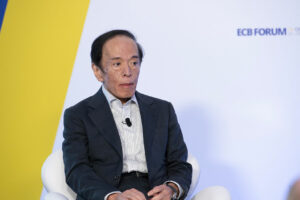
Ueda’s big day was lost in a communication black hole
AN ANCIENT Zen Buddhist koan asks, if the Bank of Japan (BoJ) hikes interest rates but nobody is able to read the statement that says so, has monetary policy actually been tightened?
For a few moments as the momentous BoJ decision approached on Wednesday, that seemed to be the terrifying prospect as armies of traders, analysts, and journalists across the globe went to the bank’s website, only to be greeted with the message: “The page you requested is temporarily unavailable due to network congestion or other issues. Please try again later.”
The bank was able to get its servers just about back up in time for the release. But it was just one of the ways Governor Kazuo Ueda struggled to get his message across.
Speaking after the bank raised rates to 0.25% in just the second hike since 2007, the governor was hard pressed to justify a decision that, prior to its being leaked overnight in multiple domestic media outlets, hadn’t been expected. (Plans to halve bond buying were largely in line with expectations and had been flagged at the last meeting).
He flailed at a number of reasons, arguing consumer spending is solid (it isn’t), that it wasn’t a major change (sure, but then why is it necessary?), before finally settling on the unconvincing logic that he wants to be ahead of the curve and avoid a sudden series of rate hikes if prices rise out of control.
That doesn’t seem too likely right now, and reporters repeatedly pushed him on the need to rush to action today without waiting for further data evidence — something the two dissenters on his board also questioned. In April, the governor seemed skeptical of the idea that the yen would have a lasting impact on prices. Has he changed his mind — or has political pressure got to him?
It also took hours for the foreign exchange market to catch up with the bombshell hidden in today’s statement: The bank said it will continue to hike rates, so long as its outlook holds. It hadn’t previously pledged such action, which is why it was surprising that traders initially seemed to interpret today’s decision as dovish; the yen didn’t strengthen until hours later, after Ueda spoke.
The whole episode betrays the continued difficulty the bank faces getting its message across. My colleague Daniel Moss and I have written at length about the bank’s leakiness; Ueda has been grilled in parliament about it. This week’s reports in the domestic media offered “an astonishing level of detail,” according to Stefan Angrick, senior economist at Moody’s Analytics, who noted not just their accuracy, but the contrast with the information blackout observed by most major central banks.
Ueda doesn’t seem to treat this threat seriously, however. He again brushed off a question about “normalization” of these leaks ahead of the decision, responding once again with an explanation that defies credulity that they were merely the result of “speculation” by media outlets. Three of those outlets independently guessed the decision, and have done so every time the Ueda BoJ has changed policy? We’re meant to buy this?
It all adds up to show that the bank should rethink how it releases its information. One good start, on top of plugging the leaks, would be setting a fixed time to release its decision. Almost alone among major banks, it merely pledges to release the decision “immediately after” the conclusion of its meeting. Interested parties the world over clicking, scraping, and parsing the website as 1 p.m. approached in Tokyo, and midnight in New York, is likely what caused the network error on Wednesday.
In 2001, when Ueda was first on the board, the BoJ added two-day meetings in order to announce its decisions during Tokyo market hours (previously, decisions could come late in the afternoon.) The logic given then was to “enable Tokyo’s financial markets to digest the decisions reached at the meetings within the day of the meeting.”
This simply isn’t happening right now. Ditto Ueda’s press conference, which takes places hours after the decision, and comes without interpretation into English, leaving room for translation errors and miscommunications. No wonder it takes so long for markets to catch up with him.
Depending on your perspective on monetary policy, Ueda has done a thorough job of looking at global peers and dismantling an easing framework that was no longer fit for purpose. Now that he has left decades of abnormal policy behind, he should also start to bring how the bank releases its information to the public into the 21st century.
BLOOMBERG OPINION



